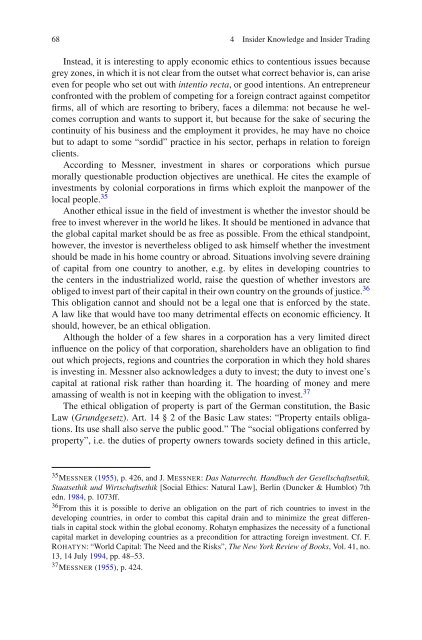The Ethics of Banking: Conclusions from the Financial Crisis (Issues ...
The Ethics of Banking: Conclusions from the Financial Crisis (Issues ...
The Ethics of Banking: Conclusions from the Financial Crisis (Issues ...
You also want an ePaper? Increase the reach of your titles
YUMPU automatically turns print PDFs into web optimized ePapers that Google loves.
68 4 Insider Knowledge and Insider Trading<br />
Instead, it is interesting to apply economic ethics to contentious issues because<br />
grey zones, in which it is not clear <strong>from</strong> <strong>the</strong> outset what correct behavior is, can arise<br />
even for people who set out with intentio recta, or good intentions. An entrepreneur<br />
confronted with <strong>the</strong> problem <strong>of</strong> competing for a foreign contract against competitor<br />
firms, all <strong>of</strong> which are resorting to bribery, faces a dilemma: not because he welcomes<br />
corruption and wants to support it, but because for <strong>the</strong> sake <strong>of</strong> securing <strong>the</strong><br />
continuity <strong>of</strong> his business and <strong>the</strong> employment it provides, he may have no choice<br />
but to adapt to some “sordid” practice in his sector, perhaps in relation to foreign<br />
clients.<br />
According to Messner, investment in shares or corporations which pursue<br />
morally questionable production objectives are unethical. He cites <strong>the</strong> example <strong>of</strong><br />
investments by colonial corporations in firms which exploit <strong>the</strong> manpower <strong>of</strong> <strong>the</strong><br />
local people. 35<br />
Ano<strong>the</strong>r ethical issue in <strong>the</strong> field <strong>of</strong> investment is whe<strong>the</strong>r <strong>the</strong> investor should be<br />
free to invest wherever in <strong>the</strong> world he likes. It should be mentioned in advance that<br />
<strong>the</strong> global capital market should be as free as possible. From <strong>the</strong> ethical standpoint,<br />
however, <strong>the</strong> investor is never<strong>the</strong>less obliged to ask himself whe<strong>the</strong>r <strong>the</strong> investment<br />
should be made in his home country or abroad. Situations involving severe draining<br />
<strong>of</strong> capital <strong>from</strong> one country to ano<strong>the</strong>r, e.g. by elites in developing countries to<br />
<strong>the</strong> centers in <strong>the</strong> industrialized world, raise <strong>the</strong> question <strong>of</strong> whe<strong>the</strong>r investors are<br />
obliged to invest part <strong>of</strong> <strong>the</strong>ir capital in <strong>the</strong>ir own country on <strong>the</strong> grounds <strong>of</strong> justice. 36<br />
This obligation cannot and should not be a legal one that is enforced by <strong>the</strong> state.<br />
A law like that would have too many detrimental effects on economic efficiency. It<br />
should, however, be an ethical obligation.<br />
Although <strong>the</strong> holder <strong>of</strong> a few shares in a corporation has a very limited direct<br />
influence on <strong>the</strong> policy <strong>of</strong> that corporation, shareholders have an obligation to find<br />
out which projects, regions and countries <strong>the</strong> corporation in which <strong>the</strong>y hold shares<br />
is investing in. Messner also acknowledges a duty to invest; <strong>the</strong> duty to invest one’s<br />
capital at rational risk ra<strong>the</strong>r than hoarding it. <strong>The</strong> hoarding <strong>of</strong> money and mere<br />
amassing <strong>of</strong> wealth is not in keeping with <strong>the</strong> obligation to invest. 37<br />
<strong>The</strong> ethical obligation <strong>of</strong> property is part <strong>of</strong> <strong>the</strong> German constitution, <strong>the</strong> Basic<br />
Law (Grundgesetz). Art. 14 § 2 <strong>of</strong> <strong>the</strong> Basic Law states: “Property entails obligations.<br />
Its use shall also serve <strong>the</strong> public good.” <strong>The</strong> “social obligations conferred by<br />
property”, i.e. <strong>the</strong> duties <strong>of</strong> property owners towards society defined in this article,<br />
35 MESSNER (1955), p. 426, and J. MESSNER: Das Naturrecht. Handbuch der Gesellschaftsethik,<br />
Staatsethik und Wirtschaftsethik [Social <strong>Ethics</strong>: Natural Law], Berlin (Duncker & Humblot) 7th<br />
edn. 1984, p. 1073ff.<br />
36 From this it is possible to derive an obligation on <strong>the</strong> part <strong>of</strong> rich countries to invest in <strong>the</strong><br />
developing countries, in order to combat this capital drain and to minimize <strong>the</strong> great differentials<br />
in capital stock within <strong>the</strong> global economy. Rohatyn emphasizes <strong>the</strong> necessity <strong>of</strong> a functional<br />
capital market in developing countries as a precondition for attracting foreign investment. Cf. F.<br />
ROHATYN: “World Capital: <strong>The</strong> Need and <strong>the</strong> Risks”, <strong>The</strong> New York Review <strong>of</strong> Books, Vol. 41, no.<br />
13, 14 July 1994, pp. 48–53.<br />
37 MESSNER (1955), p. 424.

















